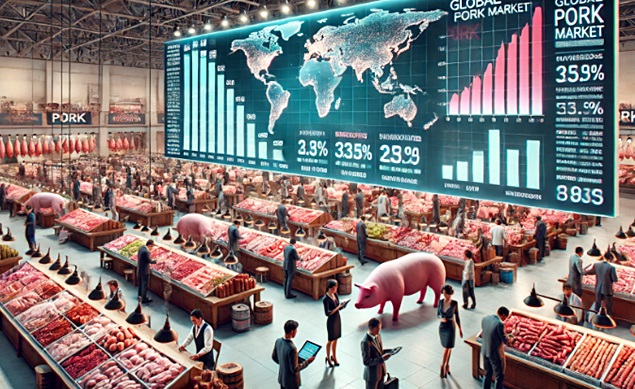1337

U.S. President Trump Tariffs All Imports from China: Global Concerns for Agriculture and the Pork Industry
U.S. President Trump has imposed tariffs on all imports from China, causing widespread concern in the agricultural and pork industries across affected countries, notes PigProgress.
Global Concerns
In addition to these announced tariffs, all steel and aluminum imports from other countries are subject to a 25% tariff. All other goods from European countries and other nations will be tariffed starting in April at country-specific rates, equal to those applied to imports from the U.S.
President Trump is known as a lifelong advocate for the use of tariffs. In theory, the tariffs will generate additional revenue for the U.S. (while reducing government spending by $4 billion per day), stimulate domestic production of food, animal feed, and other goods, "level trade relations," and lower the value of the U.S. dollar, making American exports more attractive to other countries.
Retaliation from Canada, Mexico, and China
Canadian Prime Minister Justin Trudeau announced retaliatory tariffs. In a March 4th response, he stated that Canada will implement 25% tariffs on American goods worth $155 billion.
He and other federal officials targeted a long list of American products, including nearly 400 agricultural items in the poultry, pork, dairy, grains (wheat, barley, rice), fruits and vegetables, and processed foods sectors.
To provide context, these Canadian tariffs could be lifted again. Currently, Trudeau has suspended Parliament, and he will soon resign, prompting elections that could change the situation.
Similarly, Mexico’s President Claudia Sheinbaum threatened retaliatory tariffs in early February and is expected to announce further details on Sunday, March 9th. On March 4th, China imposed tariffs of 10% to 15% on agricultural and food products from the U.S.
Reactions from Canada
A 25% tariff on Canadian pigs crossing the southern border would be particularly difficult for Canadian pig farmers. Farmers in Manitoba are especially concerned, as 40% of the province's production—around 3 million of the 8 million pigs finished annually—are exported to the U.S.
CBC News cited Rick Préjet, president of Manitoba Pork, who stated that tariffs “could have a very significant impact on what farmers and producers in Manitoba are paid for the pigs they export.”
In his view, it will come down to "how bad" a certain Manitoba producer needs to send pigs to stay afloat and how much willingness there will be among Americans to buy those more expensive pigs. “Where does this end?” Préjet asked. “It’s a big unknown.”
USMEF: "Disappointed, Agreements Not Yet Reached"
On the U.S. side, there are concerns regarding developments as well. Dan Halstrom, president and CEO of the U.S. Meat Export Federation (USMEF), stated in a press release:
“USMEF is obviously disappointed that no agreements have yet been reached to avoid or delay tariffs on goods from Mexico and Canada, as well as the increased tariffs on goods from China. We are analyzing the announced retaliatory measures from Canada and China and are awaiting details regarding Mexico’s response.
“These three markets represented $8.4 billion in U.S. red meat exports last year, including nearly $4 billion to Mexico. While the United States is the primary supplier of pork and beef to Mexico, U.S. red meat already faces increased competition in this critical market.
“Last year, U.S. beef exports equaled more than $415 per head of beef or veal slaughtered, while pork exports equaled over $66 per head slaughtered.
“These exports, many of which are underutilized cuts and offals, help producers maximize the value of each animal produced and allow U.S. consumers to enjoy more of the cuts they prefer.”
Significant Effects for Agriculture
Reagen Tibbs, a commercial agriculture educator at the University of Illinois, recently stated on a blog post on the university’s website that retaliatory tariffs will likely have "significant effects" on U.S. farmers, who already have "precarious financial outlooks" for 2025.
He noted that “the 2018-2019 trade war affected every sector of U.S. agriculture, and a new trade war would likely have the same effect.
"A reduction in U.S. exports to countries like China could open the door for other countries, such as Brazil and Argentina, to fill the gaps and surpass the U.S. as major agricultural suppliers on the world stage."





